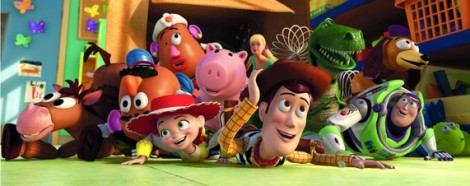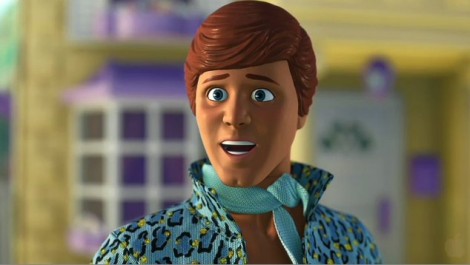Not that I was planning on seeing the movie before reading this delightfully cynical review of Toy Story 3, but now I’m not even more. – Ilene
TOY STORY 3: PIXAR BASTARDS ENGULF THE WORLD IN TEARS AND SNOT

Seriously, it beats me how people managed to develop such an appetite for sloppy sentimentality. With each successive hit feature, Pixar tests the limit of that appetite, and finds that there is no limit. Audiences drink up vats of Pixar’s patented corn syrup in animated film form, smack their sticky lips, and beg for more. Please, Pixar, could you make the characters even rounder and smoother and cuter, like a vast array of babies’ butts? Could everyone find out that everyone loves everyone else, and then all rescue each other ten or twelve times, with lots and lots of preaching along the way? Our tears, could they be jerked harder, to the point of actual pain and bruising this time?
Sure, says Pixar, and the ticket-money washes in like the tide.
Since this deplorable trend has been manifest for some time—our enabling of Pixar’s worst tendencies, I mean—it’s no surprise when they follow twee Wall-E with the grossly lugubrious Up and then top it all off with a sickening wallow like Toy Story 3. So why would I subject myself to this torture? Two reasons: 1) Michael Keaton as the voice of Ken Doll. I always liked Keaton and remain fascinated by the way he’s sabotaged his own career and squandered his great comic gifts. Keaton as Ken Doll looked funny in the previews, which gave me the faint hope that Pixar might stress the comedy over the sniveling in Toy Story 3. Curses, foiled again.

[…]
The professional critics, of course, can’t gush enough about Toy Story 3, which has a supernaturally high rating of 98% on the Rotten Tomatoes site, a score that should be reserved for the second coming of Jesus Christ artfully caught on film by the world’s best cinematographer. These godforsaken critics especially loved the last fifteen minutes, which I’m now going to describe…
[…]
What’s so distressing about all this, as I keep pointing out, is the tremendous talent of the Pixar team getting wasted on nostalgic goop, forever presenting idealized 1950s suburban culture as the norm. Superficial contemporary trappings like iPods and day-care centers and the occasional non-white minor character shouldn’t fool anybody—this is Papa Disney’s American Neverland, same as it ever was. And just like in the old Disney films, the beautiful Pixar imagery and imaginative humor and eerie inventiveness drags along with it a load of ideological crap, like a splendid thoroughbred horse hitched to a manure wagon and forced to haul it around the track. Fight the propaganda, people! Fight it!


